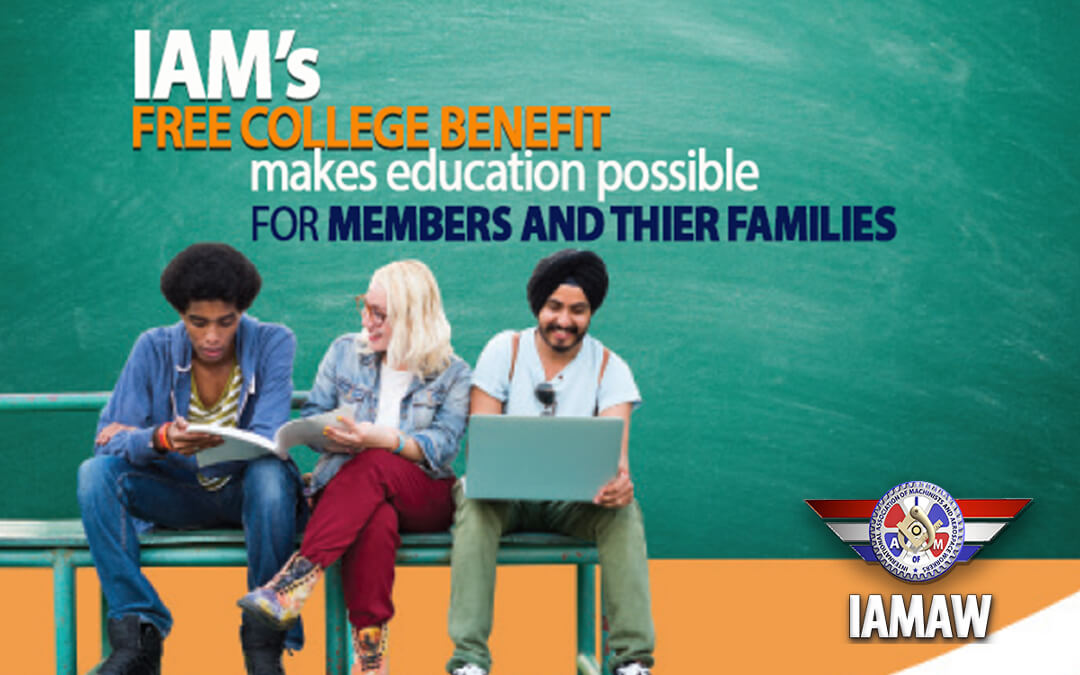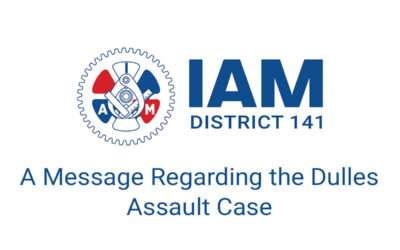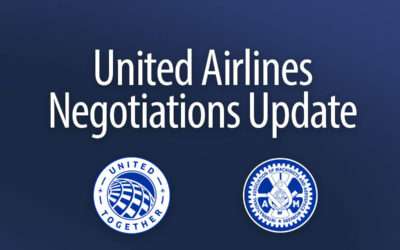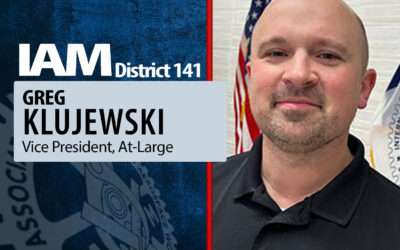Nearly two years ago, the IAM started offering a free college program to members and their families. The program has seen fast growth, and has changed to fit the needs of the members, as COVID-19 has changed the lives and work of IAM members, the IAM’s free college program has continued to expand.
Starting as a two-year associate degree-only program, it has not only expanded to include a full four-year bachelor’s degree program, but also short-term certificate programs to help members find ways to change careers quickly because of job loss.
The Beginning
The program started in Ohio with a few locals of different unions at Eastern Gateway Community College in Steubenville, OH. It’s always been difficult for workers to find the time to further their education, and Eastern Gateway found that the online learning model worked well for union workers, making it easier to juggle work, family and other issues and get education.
Working with the Student Resource Center and several unions, this has turned Eastern Gateway Community College into the fastest-growing Community College in America. Fifteen thousand union members and their families are taking advantage of the program, and the growth is only accelerating.
“That results in over $146 million in savings for union members in college tuition,” said Dan Jones, chief engagement officer of the Free College Program. “With student debt in the $1.6 trillion range, for us to be able to provide a free option for our families, is a testament to the union to have the foresight, in seeing this as an issue and then doing something about it.”
The program and Eastern Gateway and Central States University are looking to expand their academic offerings to increased degrees on both the associates and bachelor’s side, as well as short-term industry-focused certificates to help increase job opportunities for students.
Eastern Gateway College is a brick-and-mortar college, which celebrated its 50th year in 2018. The college was previously the Jefferson County Community College, and in 2010 the college expanded to include Columbiana, Mahoney and Trumbell counties in Ohio. They have campuses in Stubenville and Youngstown. The campus has over 1,000 students in each campus, as well as 1,300 high school students that are dual enrolled.
“Our four counties in northeast Ohio are some of the poorest areas, with highest pockets of poverty, certainly in Ohio, if not the United States,” said Michael Geoghegan, president of Eastern Gateway Community College. “What the free college program allows us to do is bring federal monies with these grants into these communities, and keep people employed at the college. Recently the President of the faculty union told me they now have 100 union members. Ten years ago, we had 1,000 students. If we hadn’t done what we done, we’d probably have 1,000 or 800, and there’s no way they’d have the employment – people would have to leave, there’d be layoffs. The free college program has been able to have a great economic impact in our communities.”
“In different higher-ed institutions, staff would have fought this,” said Geoghegan. “But our staff welcomed it, embraced it, and are really true partners in this, because they see the benefits for everyone.”
As tough as it is to be in a situation where a business is shrinking, it’s also hard to manage growth. “We’ve made a significant investment in technology so we can quickly ramp up growth while providing a quality education,” said Geoghegan. The college has grown 62 per cent over last year.
Adding The Bachelor’s Degree Program
As the free college program found success quickly with the associate’s degree, it was clear IAM members wanted to expand the ability to get a bachelor’s degree. The program’s newest partner is Central State University, with two locations, in Dayton and Xenia, OH. Central State offers an accelerated program that compresses a 16-week course into eight weeks to move through two terms in one semester to complete the degree faster.
To take classes at Central State, members need 60 credits or an associate’s degree. Class size is never more than 30 students in a class. Currently Central State offers bachelor’s degrees in teacher education, business administration and criminal justice. New degree programs will be coming online in 2021 and beyond.
Covid-19 Changes Everything
When the COVID-19 virus hit, Eastern Gateway was already an expert online learning, the IAM and the free college program worked to find ways to find help for members affected by job loss. While other education organization scrambled to find ways to adapt, Eastern Gateway already had the expertise and ability for proven online learning for adults.
 “We are very adaptable, very agile, so we can turn on a dime,” said Geoghehan. “We can create new programs. We’re always looking at courses and academic programs and expanding them and making them more accessible for students.”
“We are very adaptable, very agile, so we can turn on a dime,” said Geoghehan. “We can create new programs. We’re always looking at courses and academic programs and expanding them and making them more accessible for students.”
First, the IAM extends the benefit to all members on layoff status through the end of the year without requiring out-of-work stamps. Plus, the benefit is great for members with college-age children who still need education, even if the family is short on funds for college.
Eastern Gateway’s course credits are easily transferred to colleges and universities across the country. So, children with college plans and hopes can get the general education classes free and transfer them to the college of their choice.
The short-term certificate program is for laid-off members who need to acquire new skills quickly and get right back in the workforce. Certificates are available for new careers in the health care, information technology and cyber-security areas.
As COVID-19 radically altered lives, the online learning classes didn’t have to change much. “I was teaching a class this spring when the bottom fell out” said Sandi Sumerfield, chair of the professional Education Department at Central States. “People were able to go ahead as they were. The challenges they had were the same as everyone had – ‘Oh my gosh, the children are home and I’m doing online schooling with them.’ But the fact that their education and their goals were not put on hold, they were not disrupted, they were able to move forward with the program really made a big difference.”
Online Learning
Participating in online learning is on the student’s schedule. Students have weekly classes and assignments to do, when it works for them, for instance after you putting the kids to bed. Students have professors available 24 hours a day via video and email, to get questions asked and the help needed. That being said, college isn’t easy, and requires work and commitment. But at the end of the day, it’s worth it and brings a great sense of accomplishment. For students new to college and online learning, instructors recommend taking one or two classes to get your feet wet, and to gauge the workload students can comfortably handle.
Courses are in eight-week semesters, two in the spring, one in the summer, and two in the fall, so there’s always classes coming up to jump into.
It requires a computer and internet connection. While the Free College benefit usually does not allow students to take student loans, if students have extenuating circumstances the Free College staff will work with you if help is needed to buy a computer or pay for internet access.
Both colleges use the latest technologies on the computer and phone to make it easy to learn.
It’s all about finding a way to work with you to make your dreams come true.
“If you’re anxious about this process, don’t be,” said Jones. “We’ve made this a process for working adults, so make that phone call and take that next step.”
Whether it is for you, your wife or your children, pick up the phone and call (888) 590-9009 or go to the website freecollege.goiam.org to start the path today.
What Is the Future of the Free College Program?
The IAM is working to bring new course, programs and degrees that will expand opportunities to add new skills for jobs within IAM bargaining units too.
“Free College can augment our apprentice programs and other training programs the IAM has negotiated across the country,” said IAM International President Robert Martinez. Jr. “As technology changes, the Free College Program can help IAM members and their families reach their goals, for a better and brighter future for everyone. That’s what the IAM has always been about – the future.”
Too Good to be True?
As Dan Jones, Chief Engagement Officer of the Free College Program says, “In the history of our country, a safe work environment used to be too good to be true.
“A living wage was too good to be true.
“A pension was too good to be true.
“A weekend was too good to be true.
“What happened was that unions were formed, unions fought and unions gained all of these things that we now take for granted.
“When we hear college for free is too good to be true, it’s just another example of unions seeing a need, fighting to find a solution that works for its members.”
The program is funded through a last-dollar scholarship model. Many states, like Tennessee and New York, operate free college programs for their citizens on this basis. This is how the Free College Benefit operates.
Both Eastern Gateway and Central State University are part of the Ohio Department of Higher Education, fully accredited colleges and credits are easily transferrable.
All prospective students must fill out a Free Application for Student Aid (FAFSA) form for possible federal aid and grants. If the student is eligible for grant aid, the universities use that money to fund the program. If you aren’t eligible, the college includes you in the program on a last-dollar scholarship. There is absolutely zero costs to the student.
To be eligible, you must be 18, have a high school diploma or GED equivalent, and not be delinquent on prior student loan debt. In applying, the member must be in good standing or on layoff, paying out-of-work stamps if required. Family members must provide the membership book number of the sponsoring member.
- RW
Additional Details /// Story first appeared on GOIAM.org >>
RECENT ARTICLES
An Important Message Regarding the Dulles Assault Case
I am writing to provide an...
United Airlines Negotiations Update for September 16, 2025
Our negotiating team and...
Greg Klujewski Appointed IAM District 141 Vice President At-Large
Greg Klujewski Appointed IAM...




